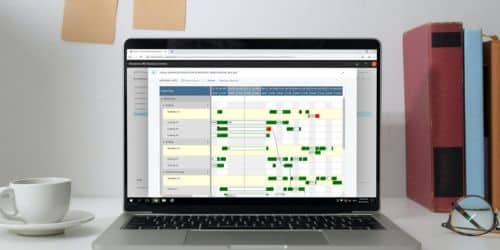A production scheduler’s job necessitates strong organizational and multitasking abilities. Professionals in this sector can work in a variety of industries and execute a variety of activities, including resolving production-related issues and assisting team members in reaching their objectives. Learning more about this profession will help you assess if it is a professional role that matches your career ambitions. In this post, we will explain what a production scheduler’s software and salary is. What a production scheduler performs, their credentials, vital abilities, remuneration, and work environment for the profession.
Production Scheduler
A production scheduler is a business expert who organizes, manages, and schedules workflows in a production team. A production scheduler is a business expert who organizes, manages, and schedules workflows for a production team. Because of their abilities, a production team can accomplish deadlines and company goals without compromising performance quality. They can plan work according to their particular dynamic since they have a thorough understanding of the production process and the abilities and competencies of their team. A team member is likely to consult the production scheduler if they have questions regarding the weekly schedule or suggestions for how to enhance a production process.
What is the Role of a Production Scheduler?
A production scheduler is in charge of a wide range of responsibilities on a production team. They collaborate with all team members to create daily, weekly, and even monthly production schedules. Production schedulers deal with unforeseen production challenges, which may necessitate reallocating resources across different teams. They ensure that everyone participating in production has the equipment and materials they need to do their jobs properly. Production schedulers also have the following extra responsibilities:
- Managing several concurrent production schedules
- Making certain that production teams reach crucial dates
- Increasing production output and efficiency
- Examining a production to identify opportunities for improvement
- Giving helpful comments to teammates
- Making long-term and short-term plans for production
What are the Academic Requirements for a Production Scheduler?
An associate degree in a discipline such as business administration, management, production, or another relevant profession is usually sufficient for a position as a production scheduler. However, if an applicant has sufficient job experience, some businesses might permit a high school diploma. Depending on the organization, a bachelor’s degree can be required for advancement in your position as a production scheduler. A professional may need to attend programs that teach computer software and application expertise for planning and organizing productions in addition to business-related coursework. Other qualifications are frequently optional rather than required. Earning them, on the other hand, may provide you access to more work prospects.
What Qualifications are Required for a Production Scheduler?
The following are some of the most critical abilities required to function as a production scheduler:
#1. Scheduling Abilities
One of the most critical abilities of a production scheduler is scheduling. Their key responsibilities include creating timetables for team members and developing a plan for how the production initiative should run. A production scheduler may set a time limit based on the requirements of their stakeholders and take into account various elements while creating the timeline, such as the size of the team or the scope of the project.
#2. Organizational Abilities
A production planner manages their responsibilities in order to prioritize tasks and satisfy any deadlines or requirements. The organization also assists them in keeping track of various timetables and meeting quotas. It assists companies in streamlining their procedures, making it easier to be more productive, and reducing the possibility of scheduling errors or mistakes.
#3. Time-management Abilities
Because of the volume of work, they must perform each day, time management is a vital skill for production schedulers. This is a skill that allows them to achieve crucial deadlines while also holding their team members accountable for finishing work on time. Production schedulers use time management skills to stay on track and avoid delays.
#4. Multitasking Abilities
Multitasking is the ability to manage, work on, and complete several projects in an efficient and productive manner. This is especially important for production schedulers, who frequently have many high-priority jobs and production objectives to complete each day. They can use this expertise to achieve their personal goals while also supporting others in accomplishing theirs.
#5: Knowledge of Computers
To accomplish their daily activities and obligations, a production planner must be computer literate. They prepare reports, timetables, and production plans using a range of computer software and applications, including project management software. These digital platforms, email, and video conferencing are also used to connect with teams. Schedulers may manage their job and handle minor troubleshooting procedures with computer skills and the ability to acquire new software.
#6. Communication Abilities
The abilities of a production scheduler enable them to properly convey goals, objectives, and timetables, ensuring that no one is confused about the overarching vision of the project. These abilities also enable them to deliver substantive comments to others in a constructive and helpful manner. Written communication abilities are required so that they can send emails, memoranda, and reports that are simple to read and understand.
#7. Self-motivation Abilities
Production schedulers benefit from the ability to operate independently and with less oversight or micromanagement. However, the ability to complete their activities without the supervision of a boss means that keeping motivated is critical for completing their duties on time. They frequently foresee hurdles and organize their actions in order to achieve goals and solve problems.
#8. Problem-solving and Critical Thinking Abilities
Problems can arise unexpectedly during the manufacturing process, requiring the team to rethink how to proceed or work around the issue. A scheduler must critically consider how to handle each situation. They should be able to employ problem-solving skills to identify the root cause and devise a workable remedy.
What is the working environment of a production scheduler?
Most production schedulers operate in an office setting, either at a single desk or in a cubicle. They do most of their work while seated at a computer. They can find work in almost any industry, including business, finance, technology, science, and manufacturing. While they carry out many of their responsibilities on their own, it is typical for them to attend meetings and contact other teams and departments regarding production issues. These professionals normally work 40 hours per week, although part-time positions are available.
Production Scheduler Salary
A production scheduler’s annual salary in the United States is $47,837. This pay estimate is subject to change due to a variety of factors, such as job experience, geographic area, educational achievements, company, and certifications. A production scheduler’s additional salary is expected to be $6,065 per year. Additional production scheduler’s salary may include a monetary incentive, commissions, points, and profit sharing. However, it is necessary to note that different companies have their own estimated budget for a production scheduler’s salary. As you gain more expertise in the area as a production scheduler, you may be able to leverage it to negotiate a better salary.
Production Scheduler Software
Fortunately, a production scheduler’s software can help. The correct software of a production scheduler may help you optimize your operations, increase efficiency, and make the best use of your resources. Here, we’ll look at five different types of production scheduler software.
#1. ClickUp
ClickUp is a high-quality production scheduler’s software that will improve your operations. Their user-friendly design makes it easy to create and manage schedules, enabling you to allocate duties, set due dates, and track progress with no effort.
ClickUp Limitations
- Some formats may change when importing data into ClickUp, depending on the CRMs from which you are importing batch files and leads.
- ClickUp has a plethora of adjustable capabilities, which might be overwhelming for individuals inexperienced with a production scheduler’s software.
Pricing for ClickUp
- Forever Free
- Unlimited: $7 per user per month
- Business: $12 per user per month
- Business Plus costs $19 per month per user.
- Enterprise: Please contact us for pricing.
#2. MasterControl
This production scheduling software uses complex algorithms and optimization strategies to build ideal production plans, reducing downtime and increasing efficiency.
Limitations of MasterControl
- The program may be best suited for people working in the life sciences or medical fields.
- Many features, according to users, are not available without a complete license.
Pricing for MasterControl
For special pricing, please contact sales.
#3. Odoo
Odoo users can quickly monitor resource availability, check the progress of each task, and detect bottlenecks or delays in the production plan. Odoo’s collaborative capabilities also encourage team members to communicate and coordinate.
Odoo Limitations
- Features may be released before they have been thoroughly tested, thus compromising the user experience.
- Some consumers expressed their desire for improved performance KPIs.
Odoo Pricing is as Follows
- One App: Free
- Standard: $31.10 per user per month
- Custom: $46.80 per user each month
#4. Visual Preparation
Visual Planning’s user-friendly interface enables users to easily construct and arrange production schedules. To maintain a seamless production flow, users may effortlessly drag and drop tasks, alter timeframes, and create dependencies. Visual Planning also provides real-time updates and notifications, bringing users up to date on the status of each assignment.
Visual Planning Limitations
- Users complained that the platform appeared to be out of date.
- The software does not appear to be as widely used or evaluated online as some of the other solutions on our list.
Pricing for Visual Planning
- VP Desk: $55 per user per month
- VP Portal costs $35 per month per user.
- VP Go costs $15 per month per user.
#5. Katana MRP
Katana MRP provides real-time visibility into production orders, enabling you to easily establish and alter schedules. Users can quickly check inventory levels, track the progress of each activity, and make educated choices to ensure prompt delivery and optimal resource usage.
How Do I Become a Production Scheduler
To work as a production scheduler, you must have prior manufacturing expertise in your business. Qualifications may also include an advanced degree in an appropriate field, based on the industry and work scope. Excellent organizational and time management abilities are required to perform the tasks of a production scheduler. Because you will frequently contact other members of the team, you must be able to communicate effectively. You must also have the physical stamina to walk and stand for extended periods of time.
Is Production Scheduling Hard?
Manufacturing production scheduling is complex; it is tough to create a production schedule that is both realistic and fits commercial needs.
What Is the Difference Between a Production Scheduler and Planner?
A planner takes into account anticipated and long-term orders, but a production scheduler takes into account detailed production needs.
What Are the Five Stages of Production Scheduling?
Production scheduling is normally done in five steps, and finishing each step before going on allows you to create an effective timetable. They are as follows:
#1. Preparation
Depending on the scope and objectives of the process, planning is broken down into two stages. Static planning is consistent across time and focuses on accomplishing a company’s long-term objectives, which can last a year or more. Dynamic planning involves developing a calendar centered on short-term objectives, such as those that must be completed within 90 days.
#2. Scheduling
This entails constructing a sequence of events that includes planning every phase to transform raw materials into a completed product. Consider the following factors when deciding the sequencing of your manufacturing process:
- Production mode
- Site of a manufacturing facility
- Employee numbers and types
- How many items should be produced?
- Resources and techniques to employ
#3. Planning
The scheduling stage entails developing a timetable for each stage of production. Here are some examples of common schedules that might be used when scheduling production:
- The master schedule covers all of the people and resources needed to fulfill the overall production goal.
- The production schedule is used to plan personnel schedules and duties.
- The production schedules for each day are included in the daily schedule.
- If you intend to sell your products in a retail setting, you can create a retail schedule for shipping things to the store and arranging them on shelves.
#4. Distribution
Dispatching entails distributing all resources required to make things. Among the resources you might use during manufacturing are:
- Employees
- Supplies of raw materials
- Equipment
- Protective equipment
- Task
#5. Implementation
This is merely the act of carrying out all of your plans. Manufacturing professionals do market research and analyze the efficiency of each stage of production scheduling to ensure that it is as efficient as possible.
What Are the Three Types of Production Scheduling?
There are 3 types of production scheduling. They are as follows:
- Master planning: This describes the full process from beginning to end.
- Production or operation planning: This production scheduling method is used to route raw supplies.
- Scheduling retail operations: This type transports finished goods from the manufacturing plant to retail outlets.
What Are the Negatives of Production Schedule?
You may not be able to adjust quickly enough to avoid difficulties if you are on a production timeline. Once things are on their way and the personnel are prepared to work, it might be tough to halt the process and start work elsewhere.
- SHIFT SCHEDULER: What is and How it Works
- JOB SCHEDULER: What It Is and Software(Opens in a new browser tab
- BEST JOB SCHEDULER: 15 Enterprise Job Scheduler Software for 2023





